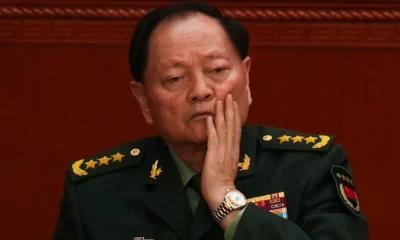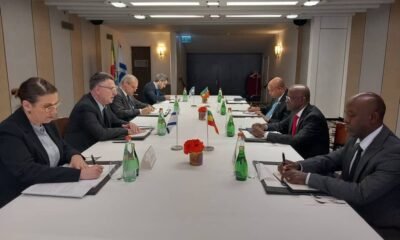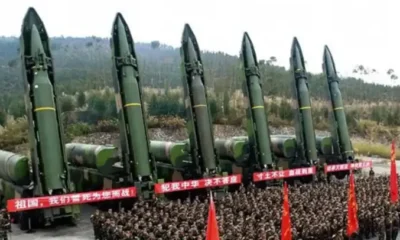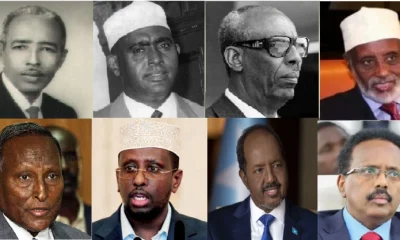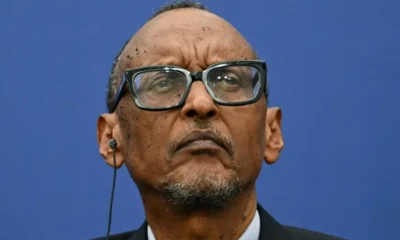Africa
Protesters Rally Against Proposed Nuclear Plant Near Forest Reserve, Tourist Hub in Kenya
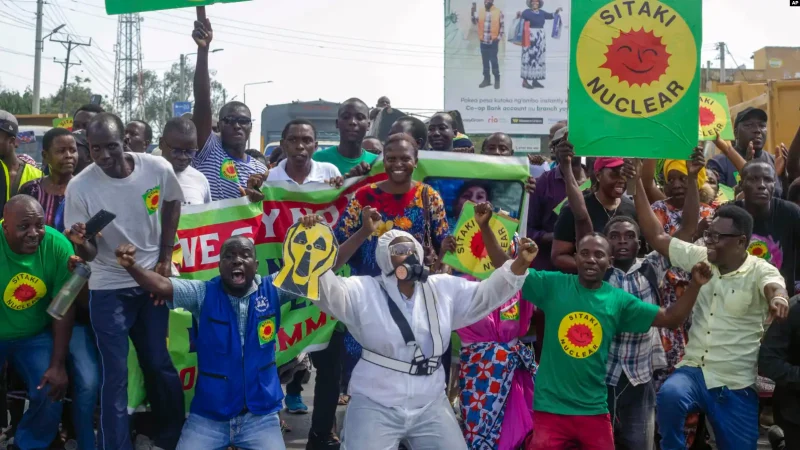
Protests have erupted in Kilifi County, Kenya, as dozens of residents and activists rally against a proposed nuclear power plant, set to be the country’s first. The coastal region, famous for its picturesque beaches and eco-tourism, is also home to the Arabuko Sokoke Forest Reserve, a vital biodiversity hotspot that is on UNESCO’s tentative list of World Heritage sites. The proposed plant has sparked concerns among the local population, who fear the environmental and health risks associated with nuclear energy.
Kilifi, located some 522 kilometers southeast of Nairobi, has long been known as one of Kenya’s premier tourist destinations, drawing visitors to its coral reefs, bird-watching sites, and pristine beaches. However, the announcement of a 1,000-megawatt nuclear facility in the area has generated heated opposition. On Friday, protesters, led by Muslim for Human Rights (MUHURI), marched through Kilifi to the governor’s office, chanting anti-nuclear slogans and carrying placards with messages like “Sitaki nuclear,” meaning “I don’t want nuclear” in Swahili. They presented a petition demanding the cancellation of the project, citing concerns about the environmental and societal impacts.
At the heart of the opposition is the Arabuko Sokoke Forest Reserve, a unique ecological site that supports rare and endangered species, including birds that attract eco-tourists from around the world. Residents and activists argue that building a nuclear power plant near this fragile ecosystem could be devastating, potentially leading to the loss of biodiversity and damage to the local tourism industry. The reserve also plays a critical role in Kenya’s conservation efforts, making the project a lightning rod for environmental advocacy.
Fears of Environmental and Health Risks
Francis Auma, a MUHURI activist, expressed his concerns during the protest, warning of the potential fallout for both humans and wildlife. “There will be malformed children born out of this place, fish will die, and our forest Arabuko Sokoke, known to harbor birds from abroad, will be lost,” he said. Other protesters echoed these sentiments, fearing for their livelihoods in a region heavily dependent on eco-tourism and fishing.
Timothy Nyawa, a local fisherman, voiced his apprehension about the plant’s potential impact on fish populations, which sustain much of the local economy. “If they set up a nuclear plant here, the fish breeding sites will all be destroyed,” Nyawa said, underlining the deep economic fears many in the community share. The construction of the nuclear plant, scheduled to begin in 2027 and projected to cost $3.8 billion, has raised questions about its long-term effects on local industries that depend on the region’s natural resources.
A Struggle for Public Participation and Transparency
Opponents of the project also argue that there has been insufficient public consultation and transparency. Phyllis Omido, executive director of the Center for Justice Governance and Environmental Action, stressed that many locals feel uninformed about the plant’s potential risks and benefits. “We host the only East African coastal forest, we host the Watamu marine park, we host the largest mangrove plantation in Kenya. We do not want nuclear energy to mess up our ecosystem,” Omido said during the rally. Her organization filed a petition in parliament last November, calling for an inquiry into the plant’s environmental and safety risks, claiming that the government had not adequately engaged with the local community.
The Kenyan Senate suspended its inquiry into the project pending the outcome of a lawsuit filed by two lawyers in July. The lawsuit seeks to halt the plant’s construction, arguing that public participation was rushed and insufficient. It also raises concerns over health, environmental safety, and the management of radioactive waste, particularly in a region prone to natural disasters like floods and drought.
Despite these concerns, Kenya’s Nuclear Power and Energy Agency (Nupea) has assured the public that environmental protections are being considered. In response to the growing backlash, Nupea noted that construction would not begin for several years and that the project complies with national environmental laws. The agency also published an impact assessment report recommending policies to mitigate potential environmental harm, such as setting up a nuclear unit within the national environmental authority and establishing emergency response teams.
However, activists and locals remain skeptical. They argue that the risks associated with nuclear energy far outweigh the potential benefits, particularly in a region with significant ecological and economic value. Juma Sulubu, a local resident who had previously been injured by police during a protest, expressed the defiance that has come to define the anti-nuclear movement in Kilifi. “Even if you kill us, just kill us, but we do not want a nuclear power plant in our Uyombo community,” he said.
As the debate over Kenya’s nuclear future intensifies, the protests in Kilifi reflect a broader struggle over how the country balances its energy needs with the preservation of its natural and cultural heritage. For the residents of Kilifi, the fight to protect their community and environment is only just beginning.
Africa
West Africa’s Coup Crisis: Five Hard Lessons Every Defender of Democracy Must Know

West Africa’s Coup Wave: Five Shocking Truths Behind the Military Takeovers Fueling Democracy’s Collapse.
How contagion, civilian support, weak international response, learned tactics, and foreign alliances are reshaping Africa’s political landscape.
Five key lessons from recent West African coups reveal why military takeovers are spreading, gaining public backing, and outlasting expectations—threatening democratic progress across the region.
Five years after Malian soldiers toppled President Keïta, West Africa and parts of the continent face an alarming resurgence of military coups. From Mali to Niger, Burkina Faso, Sudan, Chad, Guinea, and Gabon, the pattern is clear: coups are no longer isolated incidents but part of a spreading contagion threatening democratic governance.
The first truth is contagion itself. Successful takeovers embolden others, especially when coup leaders quickly consolidate control and avoid chaos. Potential plotters watch closely—if consequences are harsh, coups falter; if they succeed, copycats emerge.
Second, civilian support is pivotal. Masses cheering soldiers reflect deep dissatisfaction with civilian regimes, giving military rulers public legitimacy that shields them from opposition and international pressure. This support has been visible in Niger, Mali, Guinea, and Burkina Faso.
Third, international responses often fail to deter. Weak, delayed sanctions and symbolic suspensions send mixed signals that coups carry few lasting costs. While Niger saw some pushback, countries like Chad and Gabon faced muted international pressure, enabling entrenched military rule.
Fourth, coup leaders learn from one another. They observe and adopt tactics to entrench authority—often using elections as facades to legitimize military regimes while maintaining absolute control. This strategy has extended average junta rule from weeks to nearly 1,000 days in this latest wave.
Finally, many coup governments have pivoted away from traditional Western allies, deepening ties with Russia and forming blocs like the Alliance of Sahel States, asserting sovereignty while entrenching authoritarianism.
Together, these lessons reveal a grim reality: treating coups as disconnected events ignores the powerful dynamics sustaining and spreading military rule. The global community must confront this networked threat decisively or risk watching democracy erode further across West Africa.
Africa
Tanzania Declares Currency War — Shuts Down the Dollar, Orders Nation to Use Shilling

Foreign currencies banned in Tanzanian markets as Dar launches bold crackdown to defend the shilling and assert monetary sovereignty.
Tanzania has outlawed the use of foreign currencies for domestic transactions, triggering a regional shift in economic sovereignty. Will others follow?
Tanzania just fired a shot in the war for financial sovereignty — and the U.S. dollar was the first casualty. In a stunning move that could ripple across Africa, the Bank of Tanzania has banned the use of all foreign currencies for local transactions. Whether you’re paying for a coffee, signing a contract, or closing a million-dollar deal, the law is now clear: Only the Tanzanian shilling is legal tender inside the republic.
Effective immediately, the new policy bans pricing, quoting, or accepting payment in foreign currencies like the U.S. dollar or euro for any domestic business. Even contracts in foreign currency are now under heavy restrictions. Businesses have been ordered to rip up deals signed in dollars unless they meet strict transition timelines.
The message is clear: Tanzania is done playing second fiddle in the global currency game.
This dramatic currency lockdown comes just months after the Tanzanian shilling, once a darling of global investors, started losing ground again. After soaring 9.5% in late 2024 — becoming the world’s best-performing currency — it lost 3.6% of its value in the first quarter of 2025. The government is now taking no chances.
Tourists and foreigners are not exempt. While they can still use dollars or euros, it must be through official conversion — no backdoor deals, no shady forex kiosks, no exceptions. Anyone holding greenbacks under the table is now on notice.
What’s at stake? Everything from regional stability to Africa’s debt structure. If Tanzania succeeds, other nations with volatile currencies — from Kenya to Ghana — may follow suit. If it fails, the shilling’s slide could turn into a freefall.
But Tanzania is not retreating. With $5.6 billion in reserves, a gold-buying central bank, and strong IMF-backed growth at 5.5%, President Samia Suluhu Hassan’s government is betting that bold monetary nationalism is the path forward.
This isn’t just a policy tweak. It’s a warning shot — aimed at both the black market and the legacy of foreign financial domination. Tanzania wants to chart its own course. And it just put the dollar on lockdown to do it.
Africa
IS-Linked ADF Rampage: 23 Killed, Dozens Kidnapped in Eastern DRC

The Islamic State (IS)-affiliated Allied Democratic Forces (ADF) have launched a series of brutal attacks, resulting in the deaths of at least 23 civilians and the abduction of dozens more, according to reports from the UN Office for the Coordination of Humanitarian Affairs (OCHA).
The attacks, which unfolded over two consecutive days in the Ituri Province, saw ADF militants ravaging several villages, leaving a trail of destruction and fear. Additional reports from the OCHA highlight further violence in the Beni Territory of North Kivu Province, where another 17 civilians were killed on Wednesday, underscoring the relentless brutality of the ADF’s campaign in the region.
The ADF, originally a Ugandan rebel group, has long been a source of instability in the eastern DRC, exploiting the dense forests to establish a base of operations from which they have conducted raids and kidnappings, often targeting remote villages with little to no defense.
In the wake of the attacks, hundreds of villagers fled to neighboring areas seeking safety from the violence that has torn through their communities. The situation remains dire, with local authorities and humanitarian organizations struggling to address the massive displacement and the ongoing security crisis.
The violence also spilled over into South Kivu Province, with local medical sources reporting deadly explosions at an M23 rally in Bukavu, which killed at least 11 people and injured dozens. This incident further complicates the already tense situation in the region, where more than 125,000 people have been displaced since early February due to continuous clashes.
Humanitarian efforts have been severely hampered by the ongoing conflict, with many organizations forced to temporarily suspend their operations. However, assessments have resumed, albeit under challenging and dangerous conditions.
The UN Refugee Agency (UNHCR) has reported a significant influx of Congolese civilians fleeing the conflict to Burundi, with an estimated 60,000 people seeking refuge in just two weeks. These refugees, including men, women, and children, have undertaken perilous journeys, walking hundreds of kilometers in a desperate search for safety.
UNHCR and its partners are ramping up assistance, setting up emergency shelters and distributing essential relief items such as food, water, sleeping materials, and hygiene kits to accommodate the growing number of displaced persons.
This ongoing crisis in the eastern DRC highlights the severe humanitarian consequences of armed conflict and the urgent need for increased international support to restore stability and provide relief to the thousands of civilians caught in the crossfire.
Africa
Algeria’s Selma Haddadi Rises: The New Power Broker in the AU

Algerian diplomat Selma Haddadi secures the AU Commission deputy chair, solidifying North Africa’s influence in the continental body.
Algeria has cemented its grip on African diplomacy as Selma Haddadi—the country’s ambassador to Ethiopia—secures the African Union Commission’s deputy chairmanship. Elected during the 38th AU Summit, Haddadi triumphed over five contenders from North Africa, reinforcing Algeria’s growing clout in continental affairs.
With a bold vision for Africa, Haddadi promises to infuse fresh energy into AU leadership, unlocking the continent’s human capital and advancing the African solutions to African problems agenda. Her victory signals a strategic shift, as Algeria strengthens its position in the AU alongside Djibouti’s Mahamoud Ali Youssouf, who clinched the chairperson seat.
This election reshapes AU leadership dynamics, with North and East Africa now wielding unprecedented influence. Haddadi’s challenge? Turning AU ambitions into reality—where bureaucratic inertia often stalls progress. With her diplomatic experience and Algeria’s backing, she could be the powerbroker Africa needs to push forward urgent reforms and assert continental autonomy.
Africa
African Nations Prepare for What’s to Come After Pause on US Aid

With Trump’s 90-day foreign aid freeze in place, African nations scramble for alternatives as vital health and infrastructure programs face uncertainty.
Trump’s aggressive freeze on US foreign aid has sent shockwaves through Africa, forcing governments to confront a grim reality—decades of reliance on American funding are crumbling. Health ministries, already stretched thin, are scrambling to find solutions as critical programs, including HIV/AIDS treatment under PEPFAR, teeter on the edge. Kenya, South Africa, and Nigeria—nations where millions depend on US-backed medical services—now face an existential crisis.
The blow isn’t limited to healthcare. In Senegal, a $550 million energy project designed to expand electricity access to 12 million people is now hanging by a thread. Without US dollars, infrastructure projects could grind to a halt, leaving economies in limbo. Leaders like Senegal’s Ousmane Sonko are calling for self-sufficiency, but with economies deeply tied to Western funding, the road ahead is uncertain.
The US claims life-saving aid will continue under limited waivers, but African officials aren’t convinced. The pause is a clear warning shot—Trump’s America is done footing the bill. Nigeria has already launched a task force to explore alternative financing, but can Africa truly stand on its own without Washington’s billions? The answer may come sooner than expected, as nations scramble to reshape their economic and political alliances in a world where US support is no longer guaranteed.
Africa
Senegal’s President Fights For Mandate in Parliamentary Race
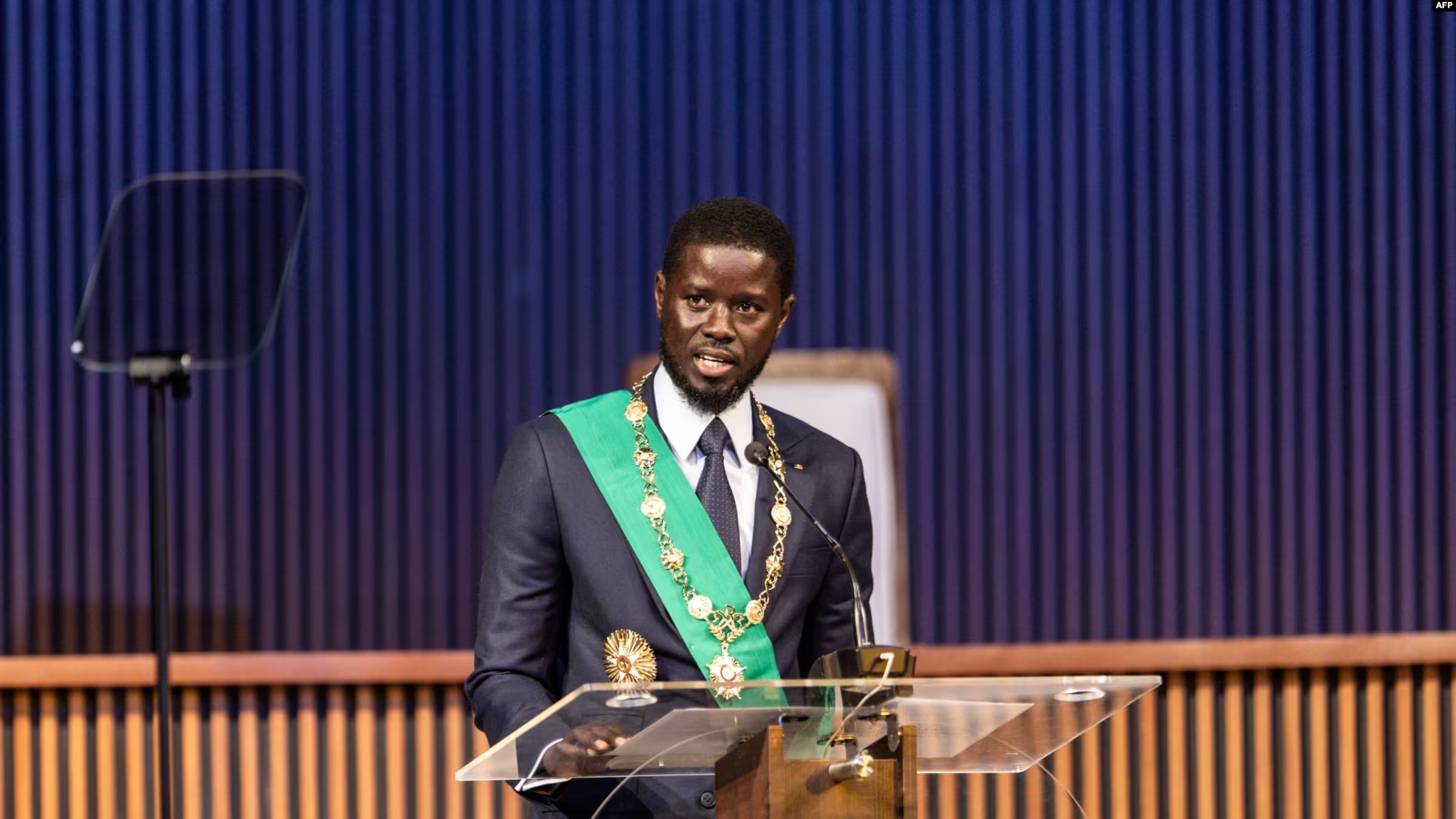
Senegal’s political landscape is bracing for a pivotal parliamentary election on November 17, as President Bassirou Diomaye Faye pushes to consolidate power and advance his reform agenda. The election follows Faye’s decision to dissolve the opposition-led National Assembly, a move aimed at overcoming legislative resistance he claims has stalled his proposed anti-corruption measures and economic reforms. Campaigning, marked by fervent rallies and town-to-town caravans, has officially begun, setting the stage for a contest that may redefine the balance of power in Senegal.
Having secured the presidency with a resounding victory in April, Faye’s leadership faces a crucial test of public confidence. His Pastef party, which previously relied on coalitions, has decided to contest the election independently, aiming for a majority that would enable Faye to pass his proposed legislation unimpeded. Yet, the path to parliamentary dominance is far from assured. An unexpected coalition has emerged between former presidents Macky Sall and Abdoulaye Wade, bringing together two of Senegal’s most seasoned political actors. Their respective parties, the Alliance for the Republic (APR) and the Senegalese Democratic Party (PDS), dominated the outgoing assembly with 106 of the 165 seats, posing a formidable challenge to Pastef’s aspirations.
“This election has symbolic significance,” notes Mamadou Seck, a political analyst, who views it as a litmus test for Faye’s popularity following his electoral promises. “The critical challenge today is for Diomaye Faye to understand whether the people who elected him with 54% still support his program.” Seck observes that Pastef’s decision to run without a coalition might reflect a strategic gamble to gauge its standalone appeal, though the party has sought to strengthen its ranks by enlisting former allies of Sall.
A core component of Faye’s pitch to voters is an ambitious 25-year development plan unveiled earlier this month. This blueprint outlines bold goals to stimulate local industries, diversify Senegal’s economy, and generate job opportunities amid a fast-growing population. These objectives resonate with Faye’s anti-corruption and development rhetoric, which have been central to his political message. If Pastef secures a parliamentary majority, the plan could proceed with fewer legislative barriers, potentially shaping Senegal’s economic trajectory for decades.
Beyond Pastef and the Sall-Wade coalition, the election also features opposition figures such as former Prime Minister Amadou Ba and Dakar’s Mayor Barthelemy Dias, who head smaller opposition alliances. Dias, a vocal critic of the current administration, has cultivated a base in Dakar, an urban stronghold critical to influencing the capital’s vote. Their involvement underscores the stakes of the parliamentary contest and highlights the diverse opposition Faye faces as he seeks to establish his administration’s legislative foundation.
As the election draws near, Faye has called for a “peaceful and dignified” campaign, emphasizing a commitment to ensuring a transparent and respectful democratic process. “I wish all Senegalese and all political actors a peaceful and dignified electoral campaign, and I guarantee that… the best will win,” Faye said in a televised address. This message of unity aims to temper the charged atmosphere surrounding the race, especially as past elections in Senegal have occasionally sparked unrest amid high political fervor.
Should Faye succeed in securing a majority, he will gain a crucial mandate to advance his agenda, allowing for potentially transformative policies. However, a strong showing by the Sall-Wade coalition could spell renewed legislative resistance, challenging Faye’s leadership and testing his ability to navigate Senegal’s complex political landscape. For Senegalese voters, this election will shape not only the immediate future but also the long-term economic and social priorities of one of West Africa’s most stable democracies.
Africa
War Affects More Than 600 Million Women and Girls, UN Says

War now affects over 600 million women and girls worldwide, a staggering 50% increase in just a decade, according to a recent United Nations report. As conflicts intensify and political landscapes shift, U.N. leaders warn that the decades of progress toward gender equality and women’s rights are increasingly at risk. U.N. Secretary-General António Guterres highlighted in a new report the troubling erosion of rights and opportunities for women, saying, “generational gains in women’s rights hang in the balance around the world.”
The findings coincide with the anniversary of U.N. Security Council Resolution 1325, a landmark decision adopted on October 31, 2000, that advocated for equal participation of women in peacebuilding and conflict resolution. More than 20 years on, women’s involvement in peace negotiations remains negligible, hampered by persistent patriarchal structures and limited decision-making power for women in peace and security matters. Guterres emphasized the enduring imbalance: “As long as oppressive patriarchal social structures and gender biases hold back half our societies, peace will remain elusive.”
The report presented a bleak outlook for women in conflict zones, where the rate of female casualties has doubled in the past year. U.N.-verified incidents of conflict-related sexual violence have surged by 50%, and the number of girls affected by violence has risen by 35%. This alarming trend is evident across various regions: from Afghan girls barred from education to Sudanese women enduring sexual violence, and displaced women in Gaza, Syria, and Yemen grappling with the grim realities of conflict.
Sima Bahous, head of U.N. Women, highlighted the pervasive sense of abandonment felt by the 612 million women and girls affected by war, stating that they “wonder if the world has already forgotten them.” Bahous also highlighted stark statistics on food insecurity and health, revealing that one in two women in conflict zones face moderate to severe hunger, and that 61% of global maternal deaths occur in 35 conflict-ridden countries.
Despite the overwhelming need, progress toward including women in peacebuilding remains stalled. Bahous cited the discouraging statistic that women’s representation in peace negotiations has averaged below 10% over the past decade, reaching only 20% in U.N.-supported processes. The U.N. recently introduced a “Common Pledge on Women’s Participation in Peace Processes,” spearheaded by Deputy Secretary-General Amina Mohammed, aimed at urging governments and organizations to appoint more women as lead mediators and to consult with female leaders at all stages of peace processes.
In response to the U.N. findings, diplomats expressed frustration at the ongoing lack of political commitment to advancing women’s roles in peace efforts. Panama’s U.N. Ambassador Eloy Alfaro de Alba spoke directly to this issue, citing the continued absence of “political will” as a key obstacle in fulfilling member states’ commitments to gender equality in conflict resolution.
With calls for concrete action growing louder, the U.N. is emphasizing the need for meaningful inclusion of women in peace processes—not only as a matter of equality but as an essential step toward achieving sustainable peace.
Africa
WHO Urges Rwanda to see off Marburg Outbreak

The World Health Organization (WHO) has commended Rwanda’s robust response to the ongoing Marburg virus outbreak, which has so far resulted in 62 confirmed cases and 15 deaths. Speaking in the Rwandan capital, Kigali, WHO Director-General Tedros Adhanom Ghebreyesus emphasized the importance of sustained vigilance, even as the number of new cases has slowed. Rwanda has recorded no new infections in the past six days, with 44 people recovering from the virus.
“We are encouraged by the fact that no new cases have emerged in recent days, but we must remember that we are dealing with one of the world’s deadliest viruses,” Tedros said during a press conference. “Enhanced surveillance, contact tracing, and infection control measures must continue at full scale until the outbreak is declared officially over.”
Marburg virus, a highly infectious pathogen similar to Ebola, has a fatality rate of up to 88%. The virus causes hemorrhagic fever, with symptoms including severe bleeding and organ failure. However, the mortality rate in the current Rwandan outbreak has been notably lower, at 24%, largely due to the country’s swift and effective response.
Tedros visited a treatment center over the weekend, where he praised the medical staff for saving the lives of two critically ill patients who had suffered multiple organ failure. “These patients were successfully intubated, placed on life support, and have since been extubated and are now recovering,” he noted. This marks the first time patients with Marburg virus have been successfully extubated in Africa, a significant milestone in the treatment of the disease.
While there are no approved vaccines or antiviral treatments for Marburg, potential therapies, including blood products and immune treatments, are currently being evaluated. Earlier this month, Rwanda also initiated a vaccination trial in a bid to curb the outbreak.
Tedros cautioned that an official declaration that the outbreak is over can only be made after 42 days—equivalent to two incubation periods—without any new confirmed cases. He reiterated that continued vigilance is critical, stressing that the nature of the virus leaves no room for complacency.
The Marburg virus is transmitted to humans via fruit bats and can spread between humans through direct contact with bodily fluids or contaminated surfaces. With Rwanda making strides in containing the outbreak, the country’s efforts are being closely watched as a potential model for managing future outbreaks of similar diseases.
-

 Analysis11 months ago
Analysis11 months agoSaudi Arabia’s Billion-Dollar Bid for Eritrea’s Assab Port
-

 Interagency Assessment2 months ago
Interagency Assessment2 months agoTOP SECRET SHIFT: U.S. MILITARY ORDERED INTO SOMALILAND BY LAW
-
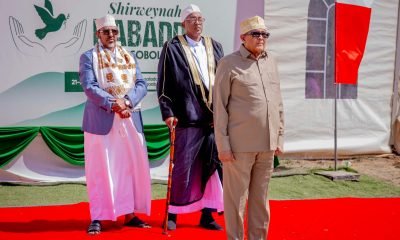
 Somaliland3 months ago
Somaliland3 months agoSomaliland Recognition: US, UK, Israel, and Gulf Bloc Poised for Historic Shift
-

 EDITORIAL1 year ago
EDITORIAL1 year agoDr. Edna Adan Champions the Evolving Partnership Between Somaliland and Ethiopia
-
Top stories2 years ago
Ireland, Norway and Spain to recognize Palestinian state
-

 Russia-Ukraine War6 months ago
Russia-Ukraine War6 months agoFibre-Optic Drones Shift Ukraine’s Drone Warfare
-

 ASSESSMENTS10 months ago
ASSESSMENTS10 months agoOperation Geel Exposes the Truth: International Community’s Reluctance to Embrace Somaliland as a Strategic Ally
-
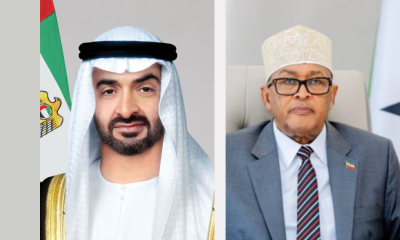
 Somaliland1 year ago
Somaliland1 year agoSomaliland and UAE Elevate Ties to Comprehensive Strategic Partnership




